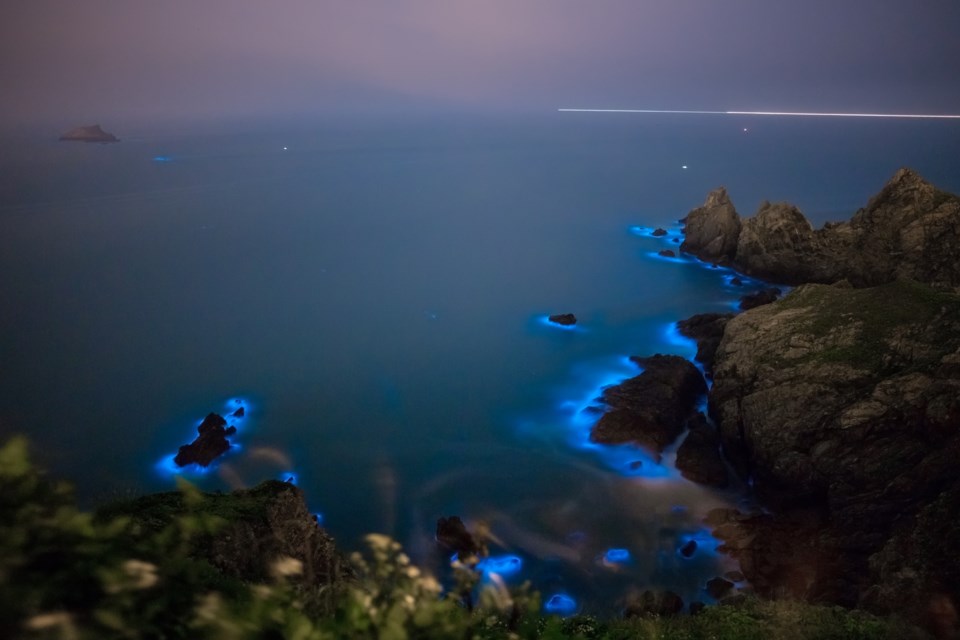
As the night falls over Vancouver next week, a celestial treat awaits those who venture to its shores – a mesmerizing display of blue bioluminescence that transforms the waters into a shimmering spectacle. Coupled with this natural phenomenon, stargazing enthusiasts are in for an additional delight, thanks to a unique lunar event that promises to illuminate the night sky.
The Glowing Waters: A Dance of Marine Magic
Vancouver's coastal waters are set to come alive with a stunning blue bioluminescent glow, an enchanting spectacle that has captivated the imaginations of both locals and visitors. This awe-inspiring phenomenon, resembling a starry night beneath the waves, is the result of tiny oceanic organisms known as dinoflagellates.
Dinoflagellates, a type of marine phytoplankton, are single-celled organisms that inhabit the waters near the surface. When these remarkable creatures feel threatened, they emit a radiant light, a strategy that serves to distract or deter predators. The luminescent display can be triggered by even the slightest disturbances – from a playful splash to the motion of the waves.
This stunning showcase of nature's artistry can be witnessed not just near the city but also a short drive away from Vancouver. To fully appreciate the spectacle, it's advisable to seek out locations free from light pollution. Bioluminescent waters are best observed in the days leading up to or following a full moon, particularly during periods of algae blooms when the phenomenon is at its most vibrant.
The Lunar Connection: A Micro New Moon and Stargazing Extravaganza
A night of bioluminescence takes on an even more magical quality during a new moon, when the sky is devoid of the moon's illumination. On the upcoming August 16, a Micro New Moon is set to grace the heavens, creating optimal conditions for experiencing the glow-in-the-dark waters around Vancouver.
The term "Micro New Moon," also known as a Minimoon or Apogee Moon, refers to a New Moon or Full Moon occurring around the moon's apogee – the farthest point in its orbit from Earth. While a New Moon is typically invisible, this unique celestial event will darken the night sky, enhancing the chances of witnessing the bioluminescent spectacle. Moreover, this occasion is equally ideal for indulging in a spot of stargazing, as the absence of the moon's bright glow allows stars and constellations to shine more brightly.
August's Celestial Carousel: Lunar Marvels
Vancouver's celestial festivities in August don't stop at bioluminescence and stargazing opportunities. Earlier in the month, a Super Sturgeon Moon graced the skies, leaving locals awestruck by its sheer beauty. Captivating snapshots of this celestial giant flooded social media, a testament to the power of the cosmos to inspire and enchant.
As the month draws to a close, a second special lunar event is poised to unfold – the Super Blue Moon. Scheduled to illuminate the night sky on August 30, this extraordinary occurrence is a fusion of two rare lunar phenomena: the Supermoon and the Blue Moon. A Supermoon appears larger and brighter than a typical Full Moon due to its proximity to Earth, while a Blue Moon refers to the second Full Moon within a single calendar month. Witnessing the convergence of these two events is a celestial spectacle that astronomy enthusiasts and casual stargazers alike will not want to miss.
In a world often characterized by bustling urban landscapes, these celestial marvels offer a glimpse into the majestic beauty of the cosmos. From the dance of bioluminescence in the tranquil waters to the ethereal charm of a night sky adorned with stars and celestial bodies, Vancouver presents a perfect canvas upon which nature's most captivating performances are showcased. So, mark your calendars, gather your loved ones, and prepare to be spellbound by the symphony of light and wonder that the skies above have in store.
Leave a Reply